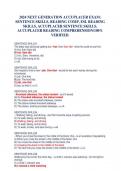2024 NEXT GENERATION ACCUPLACER EXAM : SENTENCE SKILLS, READING COMP , ESL READING SKILLS, ACCUPLACER SENTENCE SKILLS, ACCUPLACER READING COMPREHENSION/100% VERIFIED. SENTENCE SKILLS1 The baby was obviously getting too --hot, then Sam did-- what he could to cool her. A) hot, then Sam did B) hot. Sam did C) hot; Sam, therefore, did D) hot; Sam trying to do >>>B SENTENCE SKILLS2 She hoped to find a new --job. One that -- would let her earn money during the school year. A) job. One that B) job. The kind that C) job, one that D) job, so that it >>>C SENTENCE SKILLS3 --Knocked sideways, the statue looked -- as if it would fall. A) Knocked sideways, the statue looked B) The statue was knocked sideways, looked C) The statue looked knocked sideways D) The statue, looking knocked sideways, >>>A SENTENCE SKILLS4 -- Walking, biking, and driving -- are Pat's favorite ways of getting around. A) To walk, biking, and driving B) Walking, biking, and driving C) To walk, biking, and to drive D) To walk, to bike, and also driving >>>B SENTENCE SKILLS5 --When you cross the street in the midle of the block, this -- is an example of jaywalking. A) When you cross the street in the middle of the block, this B) You cross the street in the middle of the block, this C) Crossing the street in the middle of the block D) The fact that you cross the street in the middle of the block >>>C SENTENCE SKILLS6 Walking by the corner the other day, --a child, I noticed, was watching -- for the light to change. A) a child, I noticed, was B) I noticed a child watching C) a child was watching, I noticed, D) there was, I noticed, a child watching >>>B SENTENCE SKILLS7 In his songs, Gordon Lightfoot makes melody and lyrics intricately intertwine. Rewrite, beginning with --Melody and lyrics -- Your new sentence will include A) Gordon Lightfoot has B) make Gordon Lightfoot's C) in Gordon Lightfoot's D) does Gordon Lightfood >>>C SENTENCE SKILLS8 It is easy to carry solid objects without spilling them, but the same cannot be said of liquids. Rewrite beginning with --Unlike liquids, -- The next words will be A) it is easy to B) we can easily C) solid objects can easily be D) solid objects are easy to be >>>C SENTENCE SKILLS9 Excited children ran toward the loud music, and they told others about the ice cream truck outside. Rewrite beginning with --The excited children, who had run toward the loud... -- The next words will be A) music, they told B) music told C) music, telling D) music and had told >>>B SENTENCE SKILLS10 If he had enough strength, Todd would move the boulder. Rewrite, the beginning with --Todd cannot move the boulder... -- The next words will be A) when lacking B) because he C) although there D) without enough >>>B SENTENCE SKILLS11 The band began to play, and then the real party started. Rewrite the beginning with --The real party started... -- The next words will be A) after the band began B) and the band began C) although the band began D) the band beginning >>>A SENTENCE SKILLS12 Chris heard no unusual noises when he listened in the park. Rewrite beginning with --Listening in the park... -- The next words will be A) no unusual noises could be heard B) then Chris heard no unusual noises C) and hearing no unusual noises D) Chris heard no unusual noises >>>D READING COMP.1 In the words of Thomas DeQuincey, "It is notorious that the memory strengthens as you lay burdens upon it." If, like most people, you have trouble recalling the names of those you have just met, try this: The next time you are introduced, plan to remember the names. Say to yourself, "I'll listen carefully; I'll repeat each person's name to be sure I've got it, and I will remember." You'll discover how effective this technique is and probably recall those names for the rest of your life. The main idea of the paragraph maintains that the memory A) always operates at peak efficiency. B) breaks down under great strain. C) improves if it is used often. D) becomes unreliable if it tires. >>>C READING COMP.2 Unemployment was the overriding fact of life when Franklin D. Roosevelt became president of the United States on March 4, 1993. An anomaly of the time was that the government did not systematically collect statistics of joblessness; actually it did not start doing so until 1940. The Bureau of Labor Statis tics later estimated that 12,830,000 persons were out of work in 1933, about 1/4 of a civilian labor force of more than 51 million. Roosevelt signed the Federal Emergency Relief Act of May 12, 1933. The president selected Harry L. Hopkins, who headed the N ew York relief program, to run FERA. A gifted administrator, Hopkins quickly put the program into high gear. He gathered a small staff in Washington and brought the state relief organizations into the FERA system. While the agency tried to provide all the necessities, food came first. City dwellers usually got an allowance for fuel, and rent for one month was provided in case of eviction.




